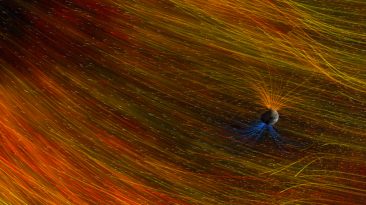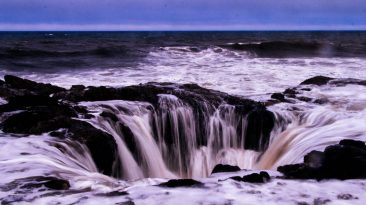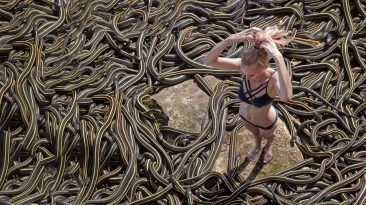Would you take your next vacation to this slimy beach? Well, what if most of our beaches were starting to look like this, because our oceans were quickly being taken over by this green sludge?
This isn’t nuclear waste these people are swimming in, it’s algae! And if it took over all our oceans, it would change a lot more about our lives than just how we vacation.
Why could it be deadly to swim in algae? What would it do to our bodies? And how would it help us save the planet?
The idea of algae taking over the entirety of our oceans may seem a little far-fetched, but it’s already taking over smaller bodies of water around the world. When algae grows densely and out of control, it’s called an algal bloom. And in 2019 there was an algal bloom so large that it could be seen from space!
Not only did it look really gross, but it was also incredibly dangerous, since it produced toxic effects for both animals and humans. But despite all the danger involved, if algae took over our oceans, it could also do wonders for our planet, as it would quickly become our biggest weapon against climate change.
And that leaves us with a dilemma. Should we fight the algae’s take over, or embrace it?
Before we can answer that question, we’re going to have to become a little more acquainted with the green stuff. Say hello to algae.
You may only know it as the weird green stuff that grows on rocks, but there’s a lot more to it. Algae is an informal term for a large, diverse group of aquatic organisms that have the ability to conduct photosynthesis.
They can occur in a variety of forms and sizes, from single microscopic cells to seaweeds. And if they took over our oceans, they could provide a much-needed helping hand in our fight against climate change.
No matter what trees or plants try to tell you, algae is the real master of photosynthesis. It provides more than half the oxygen in our atmosphere via phytoplankton and seaweed, and it consumes more carbon dioxide than trees.
While trees take generations to mature enough to really make a dent in carbon concentration, algae grows quickly, and spreads widely, giving it the potential to be even better at absorbing and consuming carbon than our woody friends. And algae isn’t just good for cleaning the air. Some kinds of algae can also provide food for marine life, food for humans, and be used as nutritional supplements.
But perhaps the most intriguing possibility of a world with algae-filled oceans is how algae could be used to replace some of the most harmful products on our planet, such as oil-based plastics. Some of the biggest oil companies are now researching whether algae can be used as a sustainable fuel source, as some researchers think it might be possible to produce 19,000 liters (5,000 gallons) of biofuel from a single acre of algae in a year.
So if we had entire oceans of this stuff, we could do a lot of good for the planet by reducing our use of fossil fuels, and by removing some contaminants from the air. But keep in mind that our oceans are gigantic, and filling them with green sludge is bound to have some negative effects on the species that rely on them.
Large masses of algae can block out the sunlight for smaller organisms living near or under it, causing aquatic plants to die. And once the aquatic plants are gone, the fish, shellfish and other marine animals that eat them would follow closely behind.
Harmful algal blooms, such as brown or red tides and blue-green algae, can contaminate public water supplies, or can accumulate in the bodies of smaller aquatic animals that are consumed by larger ones, resulting in illness or death in whales, sea lions, otters and manatees, among others.
People who eat shellfish containing dangerous algae can suffer diarrhea, seizures and even death. So if we want to harness all the positive impacts of algae, there might be a better option than allowing it to take over our oceans.
Maybe we could farm algae in land-based facilities instead. We obviously wouldn’t be able to produce oceans’ worth of algae, but we could still provide material for other uses without depriving fish and other vegetation of sunlight.
Subscribe to What-If on YouTube or follow the show on Facebook Watch.
Sources
- “What Are Algae?”. livescience.com. Accessed February 19 2020.
- “What causes algal blooms?”. cees.iupui.edu. Accessed February 19 2020.
- “Ocean Slime Spreading Quickly Across the Earth”. 2016. nationalgeographic.com. Accessed February 19 2020.
- “What are algae blooms and why are they bad?”. 2020. Popular Science. Accessed February 19 2020.
- “Algae might be a secret weapon to combatting climate change”. Lamm, Ben. 2019. Quartz. Accessed February 19 2020.
- “With Every Breath You Take, Thank the Ocean”. 2017. ocean.si.edu. Accessed February 19 2020.
- “How algae could sustainably reduce the carbon dioxide concentration in the atmosphere”. 2020. phys.org. Accessed February 19 2020.
- “The Effects: Dead Zones and Harmful Algal Blooms“. 2013. US EPA. Accessed February 19 2020.
- “Slimy green algae is taking over China’s beaches for an alarming reason”. 2020. Business Insider. Accessed February 19 2020.


























